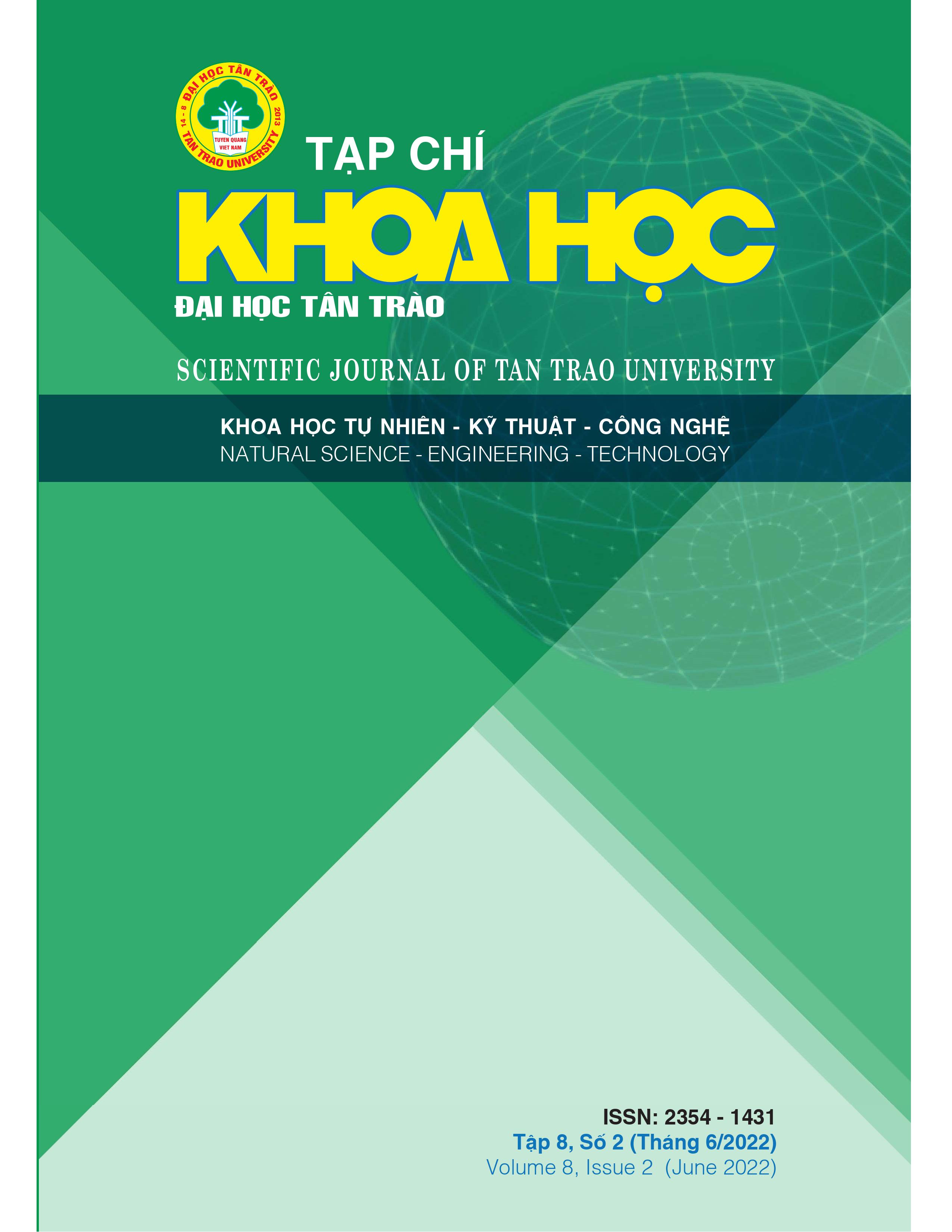PHÂN LẬP MỘT SỐ CHỦNG NẤM MEN TỪ MỘT SỐ LOẠI QUẢ ĐỂ SẢN XUẤT BÁNH MÌ
DOI:
https://doi.org/10.51453/2354-1431/2022/747Từ khóa:
nấm men, tá»± nhiên, bánh mỳTóm tắt
Từ 10 lọai hoa quả trong tự nhiên nhóm nghiên cứu đã phân lập thành công 01 chủng nấm men thu nhận từ chuối để ứng dụng trong sản xuất bánh mì. Đã thử nghiệm khả năng sản xuất bánh mì bằng chủng nấm men thu nhận được cho chất lượng cảm quan tốt.
Tải xuống
Tài liệu tham khảo
[1] Nguyen Lan Dung (2010), Textbook of Microbiology , page 330.
[2] Huynh Xuan Phong, Danh Minh Loi, Nguyen Ngoc Thanh, Le Phan Dinh Qui, Bui Hoang Dang Long, Pornthap Thanonkeo, Mamoru Yamada and Ngo Thi Phuong Dung (2017), Selection of heat-resistant yeasts and research on alcohol fermentation conditions pineapple wine, TU Can Tho University Science Library Episode 51, Part B (2017): 7 – 15.
[3] Vu Thi Oanh, Pham Thi Hong Anh, Vu Thach Duong, Hoang Thi Thuong (2017), Temperature control of fermenters and bread incubation Journal of Science and Technology of Thai Nguyen University.
[4] Sadat Khattab, Ahmed Abdel-Hadi, Nageh Fathy Abo-Dahab, Omar Atta (2016), Isolation, Characterization, and Identification of Yeasts Associated with Foods, British Microbiology Research Journal, 13.
[5] Theophilus Abonyi Mensah1and Sheila Matilda Ayorkor Tagoe (2019), Measurement of yeast growth using spectrophotometer, Content uploaded by Theophilus Abonyi Mensah .
[6] Tika B. Karki, ParashMani Timilsina, Archana Yadav, Gyanu Raj Pandey, Yogesh Joshi, Sahansila Bhujel, Rojina Adhikari, and Katyayanee Neupane1 (2017), Selection and Characterization of Potential Baker’s Yeast from Indigenous Resources of Nepal, Biotechnology Research International , Volume 2017, Article ID 1925820.
Tải xuống
Đã Xuất bản
Cách trích dẫn
Số
Chuyên mục
Giấy phép

Tác phẩm này được cấp phép theo Giấy phép Quốc tế Creative Commons Attribution-ShareAlike 4.0 .
Bài báo được xuất bản ở Tạp chí Khoa học Đại học Tân Trào được cấp phép theo giấy phép Ghi công - Chia sẻ tương tự 4.0 Quốc tế (CC BY-SA). Theo đó, các tác giả khác có thể sao chép, chuyển đổi hay phân phối lại các bài báo này với mục đích hợp pháp trên mọi phương tiện, với điều kiện họ trích dẫn tác giả, Tạp chí Khoa học Đại học Tân Trào và đường link đến bản quyền; nêu rõ các thay đổi đã thực hiện và các nghiên cứu đăng lại được tiến hành theo cùng một bản quyền.
Bản quyền bài báo thuộc về các tác giả, không hạn chế số lượng. Tạp chí Khoa học Tân Trào được cấp giấy phép không độc quyền để xuất bản bài báo với tư cách nhà xuất bản nguồn, kèm theo quyền thương mại để in các bài báo cung cấp cho các thư viện và cá nhân.
Mặc dù các điều khoản của giấy phép CC BY-SA không dành cho các tác giả (với tư cách là người giữ bản quyền của bài báo, họ không bị hạn chế về quyền hạn), khi gửi bài tới Tạp chí Khoa học Đại học Tân Trào, tác giả cần đáp ứng quyền của độc giả, và cần cấp quyền cho bên thứ 3 sử dụng bài báo của họ trong phạm vi của giấy phép.






